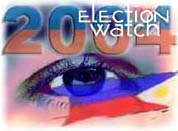|
|
Unlikely
Team
The Philippines remains
one of a few countries where politics can reconcile “strange bedfellows.”
Horacio “Boy” Morales, a hunted member of the underground revolutionary
movement in the mid-1970s-1980s, now finds himself campaigning for president
Sen. Panfilo Lacson who as a Constabulary officer, may have crossed paths with
the ex-agrarian reform secretary.
By Alexander Martin
Remollino
Bulatlat.com
 Last Feb. 4, the Partido ng Masang Pilipino (PMP), party of ousted President
Joseph Ejercito Estrada,
Last Feb. 4, the Partido ng Masang Pilipino (PMP), party of ousted President
Joseph Ejercito Estrada,
announced that it was supporting Sen. Panfilo “Ping” Lacson as the
presidential candidate of the
united opposition.
Lacson, who is
with the Laban ng Demokratikong Pilipino (LDP), had earlier confirmed his
intention to run for the presidency in 2004.
The PMP is headed by Horacio “Boy” Morales, who served as agrarian reform
secretary under the Estrada
administration. He had been promoted from campaign manager late last December.
As party president, he
would be playing a very important part in Lacson’s presidential campaign.
The two make an unlikely team.
Boy Morales
Morales, fresh from college in the University of the Philippines, was recruited
by Rafael Salas into government service in 1965 as a senior economist with the
Presidential Economic Staff of the then newly-elected President Ferdinand
Marcos. Salas was Marcos’s executive secretary and rice czar.
Morales went up
the ladder and eventually became executive vice-president of the Development
Academy of the Philippines.
He was supposed to receive an award as one of the Ten Outstanding Young Men of
the Philippines on Dec. 26, 1977. He shocked the nation – and Marcos himself
– when he failed to appear at the awarding ceremony sending instead a
statement that he is joining the underground revolutionary movement.
For five years he became an active underground organizer and was rumored to have
headed the National Democratic Front. In 1982, he was captured by the military
somewhere in Metro Manila. He was subjected to heavy physical and mental torture
for which his lawyers filed a suit against his captors.
Moralez, along with other political prisoners, was released eventually from
prison by Corazon Aquino after People Power I in Feb. 1986. From prison, it was
reported that he joined the Philippine Rural Reconstruction Movement (PRRM) and
enmeshed himself in popular democracy, a new politics that eventually isolated
himself from his national democratic comrades. But not before he would be
drafted by the Partido Ng Bayan – forerunner of today’s Bayan Muna – as a
senatorial bet in 1987.
Ping Lacson
Lacson, on the other hand, graduated from the Philippine Military Academy in
1971, together with Gregorio Honasan, who plotted several coups from 1987 to
1989. He immediately joined the dreaded Metrocom Intelligence and Security Group
(MISG).
The MISG was reportedly notorious for its practice of torture. Lacson’s hands
were not above this, according to a study of the martial law era conducted by
Yale University. The study, “Closer than Brothers,” says that Lacson,
together with Roberto Ortega (father of the former actress Michelle Ortega) and
the late Rolando Abadilla “tortured together” for more than a decade.
In 1983, he was one of the defendants in a case filed by human rights victims
against then Armed Forces Chief of Staff Gen. Fabian Ver for torture and other
inhumane acts. The defendants were convicted by a lower court but appealed their
case.
Lacson headed a task force of the Presidential Anti-Crime Commission (PACC)
during the Ramos administration. The PACC was headed by Vice President Joseph
Estrada. In 1995, he was suspended due to allegations that his men were involved
in the rubout of 11 criminal suspects allegedly belonging to the Kuratong
Baleleng kidnap-for-ransom and bank-robbery group.
In 1998, Estrada as president appointed Lacson as chief of the Philippine
National Police and head of
the Presidential Anti-Organized Crime Task Force (PAOCTF). As head of both the
PNP and the PAOCTF, he was accused of tapping telephone lines - a violation of
one of the provisions of the Bill of Rights.
His name has also been dragged into the murders of public relations man Buddy
Dacer, Young Officers Union spokesperson Baron Cervantes, and Insp. John Campos
- one of the officers who served under him in the PAOCTF during the Estrada
administration.
Nevertheless, it
was during the Estrada presidency where both Morales and Lacson became part of
the controversial president’s inner power circle. People Power II in January
2001 found Lacson breaking off his loyalty to Estrada. Morales is reported to
have been involved in the mobilization of Estrada loyalists during the May 1,
2001 siege of Malacañang.
Unusual
We are then witness to an unusual team. In the Morales-Lacson team-up, we see a
human rights victim campaigning for one who has been accused of numerous human
rights violations. Bulatlat.com
We
want to know what you think of this article.
|

